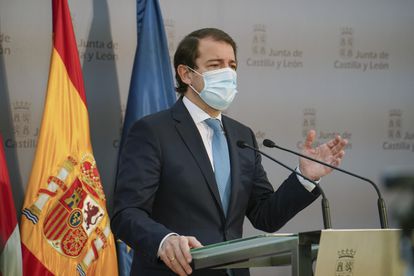Castilla y León orders closure of all bars and restaurants in bid to curb coronavirus surge
The new measures, which will go into effect on Friday, come amid concerns the Spanish region’s hospitals may be pushed to breaking point if contagions are not contained
/cloudfront-eu-central-1.images.arcpublishing.com/prisa/WP6M7FEKENEYJNTUHDZMYNRQEA.jpg)

The regional government of Castilla y León, in northwestern Spain, on Tuesday approved the closure of the region’s hostelry sector and shopping malls from Friday onward in a bid to slow the spread of the coronavirus.
“The figures are alarming and Castilla y León is at the maximum risk level,” said the premier of Castilla y León, Alfonso Fernández Mañueco, referring to the Health Ministry’s coronavirus alert system that assesses the level of risk in a territory based on key data points. According to this system, Castilla y León is at Level 5, indicating “extreme risk.”
Fernández Mañueco said that restaurants that offer home delivery or take-away will be allowed to remain open.
The figures are alarming and Castilla y León is at the maximum risk levelPremier of Castilla y León Alfonso Fernández Mañueco
The decision was made following a meeting of the region’s coronavirus expert committee, which assesses how to respond to the ongoing health crisis. Based on their recommendations, the regional government also agreed to close shopping malls and retail parks. This will not apply to stores that provide essential services and goods, or to retail shops that are smaller than 2,500 square meters and have direct street access. Visits to senior homes and child protection centers will also be suspended, except in unspecified circumstances.
Under the new rules, sporting activities in indoor spaces will be banned, with the exception of training for professional athletes and official games, which will not be open to the public. The region will maintain the current curfew, which is between 10pm and 6am, as well as the six-person limit on social gatherings. “These are tough measures,” said Fernández Manueco at Tuesday’s press conference.
The new restrictions come amid a surge in coronavirus infections in the region, with the 14-day cumulative number of cases per 100,000 at 828 – much higher than the national average of 521.07. Since October, Castilla y León has reported nearly 2,000 new coronavirus cases every day. Diagnoses have risen 34% in the last 15 days, seven points higher than the average in Spain. The rising number of cases has put the region’s hospitals under greater strain, albeit at a slower rate than the average. Despite this, coronavirus patients now occupy 23.17% of hospital beds and 37.5% of intensive care units (ICUs) – higher than the national average, which is 15.51% and 27.97% respectively.

The news comes just one day after the Asturian government announced that all non-essential business activity would be suspended from Friday in an effort to contain contagions. In Asturias, however, the 14-day cumulative number of coronavirus cases per 100,000 inhabitants is less than half the figure in Castilla y León: 400 compared to 828. Despite this, the Asturian government called for the central government to authorize home confinement for 15 days – a request that was denied on the grounds that it was better to first assess the impact of the current coronavirus restrictions in place, such as the nighttime curfew and perimetral lockdown of the region.
Other regions and territories are also considering home confinement. Juan Jesús Vivas, the leader of the North African exclave cities of Ceuta, said on Wednesday that he would ask the government to authorize the measure. He also announced the suspension of all non-essential business and social activity in the territory.
In Castilla y León, regional health chief Verónica Casado has also insisted that the central government provide regions with the legal framework to order home confinements, if deemed necessary. The current state of alarm, which has been approved by parliament for six months, grants central and regional authorities the power to introduce restrictions on mobility, but stops short of letting regions impose unilateral home confinements. Casado warned that if the curve of contagions is not flattened, the region’s hospitals may be pushed to breaking point.
English version by Melissa Kitson.
/cloudfront-eu-central-1.images.arcpublishing.com/prisa/TAQQLDBEINCYFPMQSLWARKRMEA.jpg)
/cloudfront-eu-central-1.images.arcpublishing.com/prisa/7EBDJ7QQJVETZNBVIFHBWUFDLM.jpg)










































